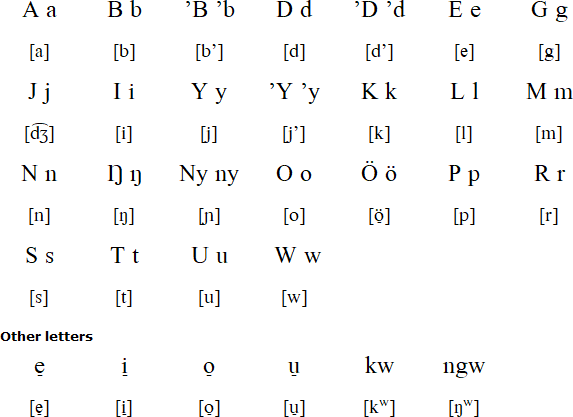Bari is an Eastern Nilotic language spoken mainly in South Sudan, also in northwest Uganda. In South Sudan it is spoken Juba county in Jubek state, and in Kajo Keji and Lainya counties in Yei River state. In 2013 there were about 595,000 speakers of Bari in South Sudan, 420,000 of whom speak it as a first language.
In Uganda Bari is spoken in Koboko and Yumbe districts in the northwest of the country. According to the 2002 census, there are 60,000 speakers of Bari in Uganda.
Bari is spoken by a number of different tribes, including the Bari, Pojulu, Kakwa, Nyangwara, Mundari and Kuku. Each one has their own variety of the language.
Dialects of Bari include Bari, Kuku, Nyangbara, Nyepu, Pöjulu and Ligo.

Bari is a tonal language with two tones: high and low. The high tone can indicated by an acute accent (á), however only linguists and some writers indicate tones in written Bari.
Download an alphabet chart for Bari (Excel)
Ŋutu liŋ yuŋwe kana, jojo i todʼiri ko dʼekesi ko ti se tokitaki ko ‘börik ko mulökötyo lo toluŋscran. Se a dʼoka ko denet na kulya na ʼbut ko narok.
All human beings are born free and equal in dignity and rights. They
are endowed with reason and conscience and should act towards one another
in a spirit of brotherhood.
(Article 1 of the Universal Declaration of Human Rights)
Information about the Bari language
https://en.wikipedia.org/wiki/Bari_languages
https://fr.wikipedia.org/wiki/Bari_(langue_nilotique)
http://www.ethnologue.com/language/bfa
http://www.ethnologue.com/language/keo
http://www.ethnologue.com/language/mqu
Acholi, Adhola, Alur, Anuak, Ateso, Bari, Belanda Bor, Datooga, Dholuo, Dinka, Dongotono, Kakwa, Karamojong, Keiyo, Kipsigis, Kuku, Kupsabiny, Lango (South Sudan), Lango (Uganda), Lopit, Lotuko, Maasai, Mandari, Markwet, Nandi, Nuer, Nyangatom, Nyepu, Terik, Toposa, Tugen, Turkana
Languages written with the Latin alphabet
Page last modified: 01.06.25
[top]
You can support this site by Buying Me A Coffee, and if you like what you see on this page, you can use the buttons below to share it with people you know.

If you like this site and find it useful, you can support it by making a donation via PayPal or Patreon, or by contributing in other ways. Omniglot is how I make my living.
Note: all links on this site to Amazon.com, Amazon.co.uk
and Amazon.fr
are affiliate links. This means I earn a commission if you click on any of them and buy something. So by clicking on these links you can help to support this site.
[top]